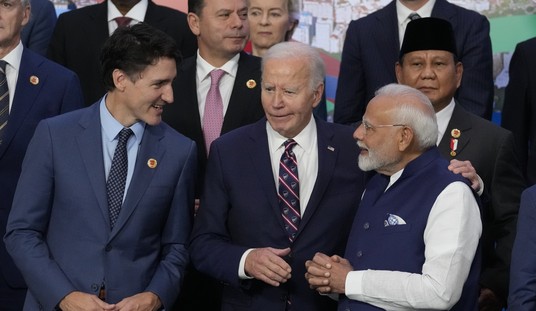This seems to be the latest in a series of reminders that national “conversations” on social issues should be conducted as monologues and lectures rather than dialogue and exchanges of perspective. TV star and former child actress Mayim Bialik wrote a lengthy essay for the New York Times last week on her perspective of Hollywood as someone with an unconventional beauty, as well as the toxic work environment for actresses in general. Decrying the objectification of women in the entertainment industry, the “Big Bang Theory” star said her approach to working in the industry is not to give in to the objectification, either in dress or in other action.
And that turned out to be … problematic:
I grew up constantly being teased about my appearance, even from members of my family; my nose and chin were the main objects of discussion. As a teenager I started obsessing over the possibility of a nose job so that I would look more like Danica McKellar, with a chin job to balance things out. Soon I wondered if I should get breast implants to look more like Christina Applegate, who got so much attention for her curves. I consistently felt like a troll compared to many of my contemporaries. A “TV Guide” critic described me, in a review of the pilot episode of “Blossom,” as having a “shield-shaped” face of “mismatched features.” I never recovered from seeing myself that way.
I always made conservative choices as a young actress, largely informed by my first-generation American parents who were highly skeptical of this industry in general — “This business will use you up and throw you away like a snotty tissue!”— and of its men in particular: “They only want one thing.” My mom didn’t let me wear makeup or get manicures. She encouraged me to be myself in audition rooms, and I followed my mother’s strong example to not put up with anyone calling me “baby” or demanding hugs on set. I was always aware that I was out of step with the expected norm for girls and women in Hollywood. …
I still make choices every day as a 41-year-old actress that I think of as self-protecting and wise. I have decided that my sexual self is best reserved for private situations with those I am most intimate with. I dress modestly. I don’t act flirtatiously with men as a policy.
Bialik knew that would provoke a strong reaction from other feminists in her industry. She included the principle that women should be free from attack intrinsically, but challenged them to change the culture more significantly:
I am entirely aware that these types of choices might feel oppressive to many young feminists. Women should be able to wear whatever they want. They should be able to flirt however they want with whomever they want. Why are we the ones who have to police our behavior?
In a perfect world, women should be free to act however they want. But our world isn’t perfect. Nothing — absolutely nothing — excuses men for assaulting or abusing women. But we can’t be naïve about the culture we live in.
That was a provocative argument to make while Harvey Weinstein’s alleged victims were still deciding whether to speak up, to be sure. However, it seems churlish to read those first three paragraphs outside the context of Bialik’s overall argument about the industry in general and how it objectifies women. It also objectifies men, undeniably, but not even close to the same degree, and Bialik’s argument here is that women in the industry should stop cooperating in that effort — not that they’re asking to be assaulted.
As producer Linda Bloodworth Thomason puts it in a think piece about the Weinstein scandal for The Hollywood Reporter, it’s not just the casting couches that treat women differently than men, but also the casting choices and the roles themselves where the disparity shows up:
Deep-rooted gender inequality exists everywhere. There are very few women in positions of real power. Females continue to earn far less than their male counterparts. And as for ageism, most actresses are resigned to the idea that when someone like Michael Douglas finally retires, there’s a good chance Blythe Danner, Gwyneth Paltrow and Apple Martin will all have played his wife. The oversexualization, humiliation and brutalization of women on television and in movies remains rampant.
The most memorable male-on-male rape occurred in Deliverance more than 40 years ago. Since that single encounter, literally hundreds of thousands of women have been raped and brutalized on film, almost without remark. One might say it’s our industry’s greatest sport.
Just as degrading is Hollywood’s endless obsession with hookers. If you are among the lucky 15 percent of actresses who do periodically find employment, chances are you’ll be stepping into the world’s oldest profession. In 89 years of Academy Awards, 25 women have been nominated for playing a prostitute. The only silver lining in all this is that no actress will ever have to worry about playing an old prostitute.
In the same think piece, though, Bloodworth Thomason goes on to excuse her pal Bill Clinton for his serial abuse and exploitation of women, which seems more criticism-worthy than Bialik’s argument.
In any event, though, Bialik felt compelled to profusely apologize for sharing her own story about dealing with Hollywood’s meat market:
— Mayim Bialik (@missmayim) October 18, 2017
Perhaps Bialik’s foray into the fray could have been better timed, but Bethany Shondark Mandel sees no reason for apologies. Why, she wonders, is Bialik’s perspective less legitimate than others in her industry — especially since it involves looking at the problem more holistically and in more depth?
The realistic view of the problem Bialik portrayed in the Times is refreshing to hear in a culture now dominated by political correctness …
What Bialik was doing was being candid about her own sometimes stringent efforts to be taken seriously and avoid ill-treatment in a degrading, appearance-oriented culture. Many of us take these kinds of precautions and whether they’re statistically effective or not, they are a part of life as a woman.
What is perhaps most mystifying and disappointing about the Bialik pile-on is just how willing her former allies were to throw her to the wolves for stating what is, to me at least, an obvious if unfortunate, fact of life: that there are often things we can do to reduce the risk of finding ourselves in worst-case scenarios.
Bialik’s critics were willing to ignore the entirety of her past comments on women and feminism in order to make an enemy where none exists.
The most assertive act a person can commit is to take control of one’s own actions. That’s not the only step in solving the endemic problems in the entertainment industry, but Bialik never argued it was — in fact, she argued just the opposite. But rather than attack Bialik for sharing that perspective, perhaps her colleagues would be better advised to start testifying to the abuse they’ve witnessed as well as personally experienced, and demand the same of others in their industry.
Update: I first identified Bethany Mandel as Bethany Shondark, just out of force of habit of having followed her for years on Twitter and blogs. I’ve corrected it above by adding her married name. My apologies.







Join the conversation as a VIP Member